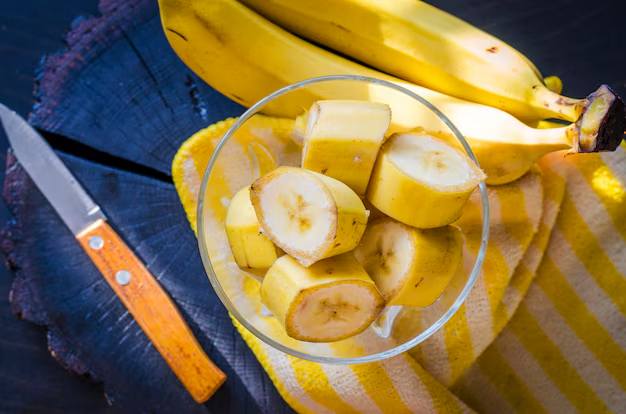Should You Keep Bananas in the Refrigerator? Exploring Best Practices for Banana Storage
Bananas—beloved for their sweet taste, nutritional benefits, and convenience—are a staple in many households' fruit bowls. But the question of the best way to store them often arises: Should bananas be kept in the refrigerator? Let’s peel back the layers on this topic and discover the optimal ways to store bananas to maintain their freshness, extend their shelf life, and maximize their flavor.
🌟 Bananas: A Brief Overview
Before diving into storage methods, understanding the nature of bananas helps us make informed decisions. Bananas are tropical fruits that thrive in warm climates. They are picked green and ripen as they travel to consumers, completing their journey to sweetness on kitchen counters worldwide.
Nutritional Value of Bananas
Bananas are popular not only for their flavor but also for their nutritional profile:
- Rich in potassium, supporting heart health and muscle function.
- A good source of vitamin B6 and vitamin C.
- Contain dietary fiber that aids digestion.
With these benefits in mind, preserving bananas' quality is crucial to reaping these rewards.
🍌 The Ripening Process: What Happens to Bananas?
Understanding how bananas ripen is key to deciding on the best storage method. The ripening process involves a chemical reaction where starches break down into sugars, causing the fruit to soften and become sweeter. Factors influencing this process include ethylene gas, temperature, and humidity.
Ethylene Gas: The Ripening Agent
Bananas emit ethylene gas, a natural plant hormone that triggers the ripening process. This gas accelerates ripening, which is why bananas kept together or with other ethylene-producing fruits ripen faster.
Temperature's Role in Ripening
- Warm Temperatures: Speed up ripening. Bananas are typically stored at room temperature to ripen after purchase.
- Cold Temperatures: Slow down ripening. This is where refrigeration comes into play, potentially prolonging shelf life.
🥶 To Refrigerate or Not to Refrigerate?
The decision to refrigerate bananas hinges on their ripeness stage and intended use. Let’s examine the benefits and drawbacks of refrigeration, breaking it down by banana skin color as an indicator of ripeness.
Green Bananas
- Pros of Refrigeration: Slows ripening, extending shelf life and allowing consumers to buy in bulk without immediate softening.
- Cons of Refrigeration: Cold temperatures can halt the ripening process entirely, potentially resulting in a less flavorful banana.
Yellow (Ripe) Bananas
- Pros of Refrigeration: Keeps bananas at the perfect stage of ripeness for longer, preventing over-ripening.
- Cons of Refrigeration: The peel may blacken, giving an unappealing appearance. However, the fruit inside remains unaffected.
Brown (Overripe) Bananas
- Pros of Refrigeration: Extends usability for baking or smoothies. Already sweet and soft, they can be preserved for future use without further ripening.
- Cons of Refrigeration: Can become mushy over time if stored too long.
Conclusion on Refrigeration
Refrigerating bananas can be beneficial depending on their ripeness and intended usage. While refrigeration slows ripening, it may not always improve quality; understanding when and how to refrigerate is essential.
🍴 Practical Tips for Banana Storage
Finding the balance between convenience and freshness requires some strategy. Here are practical methods to optimize banana storage:
Keeping Bananas Fresh at Room Temperature
- Separate: Store bananas away from other ethylene-emitting fruits to slow ripening.
- Hang Them Up: Use a banana hanger to enhance airflow, preventing moisture buildup that accelerates spoilage.
- Use a Banana Bag: Specially designed bags can slow down ethylene emission.
When to Use Refrigeration
- For Immediate Use: Wait until bananas reach your desired level of ripeness before refrigerating.
- Batch Cooking: Refrigerate overripe bananas to delay spoilage and use in cooking or smoothies.
Freezing for Long-Term Storage
If you have excess bananas and refrigeration isn't suitable, freezing is an excellent alternative:
- Peel and Slice: For easy future use in smoothies or desserts.
- Whole Bananas: Peel before freezing, or freeze with the peel to protect them, albeit more challenging to use.
- Smoothies & Baking: Ideal for ready-to-use frozen fruit. Use frozen slices directly in your recipes.
🍌 Practical Takeaways: Storing Bananas Like a Pro
Here's a quick summary of banana storage tips for optimal flavor and longevity:
- ✅ Room Temperature: Start ripe bananas here for the best flavor.
- ✅ Refrigerate Ripe Bananas: To extend shelf life without affecting internal quality.
- ✅ Freeze Overripe Bananas: Perfect for smoothies and baking.
- 🚫 Avoid Refrigerating Green Bananas: Can hinder optimal ripening.
📝 Note: The appearance of the peel doesn't always indicate the quality of the fruit within.
🌍 Expanding Beyond Banana Storage
Given bananas' reach across the globe, they intertwine with cultural practices and food trends. For example, in many regions, bananas are not only a fruit but also cooked as a staple food. This versatility influences how they are stored and used beyond their life as fresh produce.
Cultural Perspectives on Banana Storage
- Asia & Africa: Often consumed as plantains, used in cooking, influencing storage techniques that focus on preservation for cooking rather than fresh consumption.
- Western Markets: Focus on fresh consumption, impacting how bananas are handled and marketed.
Sustainability and Waste Reduction
Rethinking banana storage is not only about personal convenience; it also relates to broader issues of sustainability and minimizing food waste. Effective storage affects the amount of food waste generated, as consumers can match supply with demand more proficiently, utilizing bananas before spoilage.
Ultimately, whether to refrigerate bananas comes down to personal needs and preferences. By understanding the science and practicalities of banana ripening and storage, you can make informed decisions that suit your lifestyle and maximize the fruit's potential. Embrace the flexibility of bananas—from fresh-sliced fruit to baked banana bread—and enjoy their delightful versatility in your kitchen! 🍌

